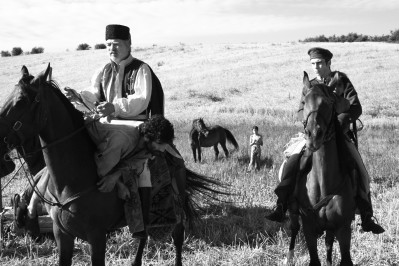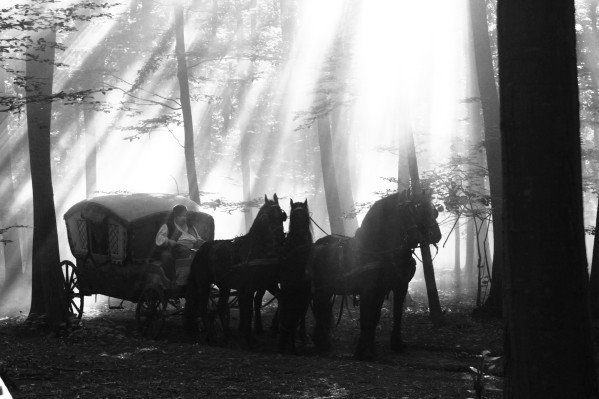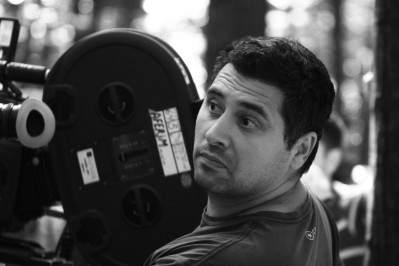INTERVIEW: ‘Aferim!’ director looks back at eastern European history

Aferim!, the new film from director Radu Jude, explores themes of religion, prejudice, punishment and freedom in 19th-century Romania. Filmed in black and white and featuring a towering performance from Teodor Corban, the movie is a harsh look at eastern European feudalism and the plight of a gypsy slave who must face the consequences of an illegal affair with a nobleman’s wife.
Jude’s film was the official Romanian entry at this year’s Academy Awards and won the Silver Bear for Best Director at the Berlin Film Festival. Audiences will recognize several cinematic influences in the film, especially the western. At its heart, Aferim! is a roadtrip movie following a constable (Corban) and his son (Mihai Comānoiu) as they seek out the man in question (Toma Cuzin) and bring him to the nobleman (Alexandru Dabija). Along the way, they eat, joke, have run-ins with the clergy and are witnesses to an unfair system of violence and slavery.
The question throughout the movie becomes whether the son will follow in the father’s footsteps.
Recently, Jude exchanged emails with Hollywood Soapbox about the film and the production process. Questions and answers have been slightly edited for style.

What was your goal in making Aferim!? What do you want audiences to take away from the film?
It is a difficult question, since I believe a film cannot have a practical “goal,” unless it is an advertising film or a propaganda film. … I can only have a slight idea what prompted me personally in researching the theme and eventually direct a film.
First of all, the desire to search in the past things that are still relevant today. To make a kind of research regarding the history of mentalities as well. And the power relations. And to discuss a topic which is not publicly discussed: the slavery of the Roma population. And the desire to use a lot of folklore texts that I think are meaningful in depicting a society and its thinking. The desire to use some themes and formal elements that belong to the American classical western. The desire to provoke the thinking of my compatriots regarding how we perceive our dark spots of our history. And so on. But the fact that the organisation “Active Watch” awarded the film and considered it important in changing a bit the mentalities gives me hope that a film can be useful too in other ways than only the entertainment or artistic ones.
What do you believe the film says about the constable and his son? It would seem some negative attributes will be passed down from one to the other, but there’s hope the son will move in more positive directions.
Yes, it was our intention to show how mentalities pass from one generation to another and, on the other hand, to show that someone can break free from the ideologies which are passed down to him or her. In the end, the generation of the son [is] the one that brought some positive changes in the Romania of that time. The intention of this small hope was there all the time.

Teodor Corban offers an anchoring performance as the constable. What do you find so special about his performance?
Corban is simply a great actor. He is intelligent and has a wide range of acting techniques. And what’s more, he is not shy or fearful in showing the ridiculous side he has (as any other human being). And this is what I appreciate the most.
How difficult and long was the production? It appears that it was a very physical, demanding set.
We had only 23 days of shooting. We couldn’t afford more. And yes, it was difficult for the actors and the set-dressing department. For the director is always easy.
Did you have to research a lot about eastern Europe and the early 19th century? How much is based on historical documents?
Yes, we researched a lot. Especially the two years prior to the shooting. We based all the important narrative parts on existing documents and the language was reconstructed using literary sources, popular ones or with known authors. It was a pleasure.
Why call the movie Aferim!?
“Aferim” means “well done, bravo” in Turkish. It is a word seldom used today, but a regular one in the 19th century. And this title is not only ironical when one thinks of the film itself, but it is also a symbol for the way those in power (any kind of power) use to express their superiority: by congratulating the weak ones when they do what they are supposed to do. So “aferim” is a symbol for how a society gets to a kind of homeostasis and how difficult it is to change it.
By John Soltes / Publisher / John@HollywoodSoapbox.com
- Aferim! opens in New York, San Francisco and Los Angeles Friday, Jan. 22. Click here for more information.

